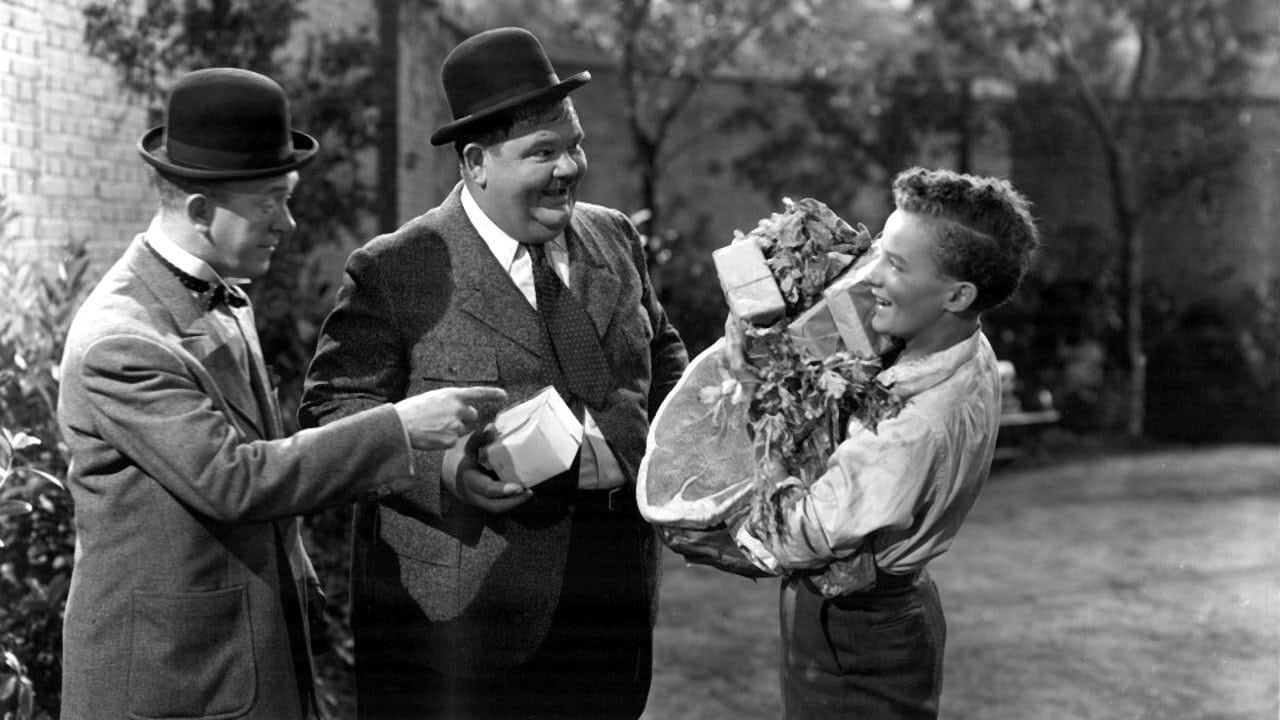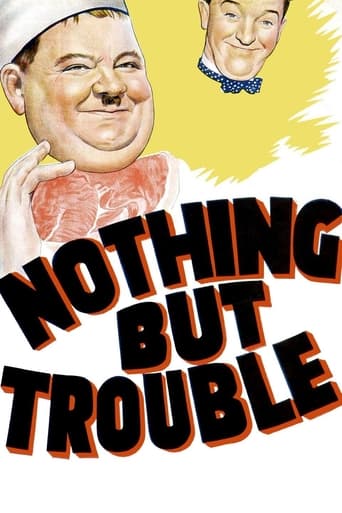Diagonaldi
Very well executed
SincereFinest
disgusting, overrated, pointless
Plustown
A lot of perfectly good film show their cards early, establish a unique premise and let the audience explore a topic at a leisurely pace, without much in terms of surprise. this film is not one of those films.
Juana
what a terribly boring film. I'm sorry but this is absolutely not deserving of best picture and will be forgotten quickly. Entertaining and engaging cinema? No. Nothing performances with flat faces and mistaking silence for subtlety.
classicsoncall
I've been catching a slew of the old Laurel and Hardy films and shorts on cable recently, most of them from the Twenties and Thirties. This one from 1944 held a couple of notable differences for me. First off, because it was an MGM movie the production values were a lot better, having more to do with the improvement in filming technology than anything else I imagine, although the budget would probably have been a factor as well. But the other thing was how much Stan had aged and filled out his features, it seemed to make him less funny. Ollie not so much, he looked more like the 'old' Ollie than Stan looked like the 'old' Stan, if you get my meaning.Parting from the Roach Studio format was also apparent. There was more of an emphasis on a story that included other players, so it took the Boys out of the action from time to time. The main plot seemed a little troubling to me, an elderly Prince Saul (Philip Merivale) was in league with a colleague named Ronetz (John Warburton) to poison the pre-teen King of Orlandia (David Leland), apparently in order to affect the line of succession. Obviously with Laurel and Hardy on the case, this wasn't going to happen, but it does seem a grisly topic for one of their stories.Though the backdrop of World War II is never mentioned by name, one can't miss the reference to using ration cards at the market, a staple of the era. I wonder what modern day viewers think of that if they've never learned what rationing was all about. For their trouble though, the slab of horse meat Stan and Ollie swiped from the hungry lion proved disastrous as a dinner menu item at the Hawley's. But it did lead to that funny scene with the two-man saw trying to carve it up for eating.The young actor portraying King Christopher looked familiar, however it was shocking to look up his credits page on IMDb and learn that David Leland died at the age of sixteen, some four years after this picture was made. He looked like he might have had a successful career moving forward, so there's that unhappy element on which to close this review. For his part, Leland's character was presented as a typical royal who preferred to be a commoner, and he had a finely tuned rapport with Stan and Ollie.
mark.waltz
In 1932, when jobs were as hard to find as a girdle on a welder (so the narration says), Laurel and Hardy went to Europe to find work. They return years later during World War II (when jobs were as easy to find as a girdle on a welder). They return to the same agency where they had previously been unable to find a job to find potential employers now in line where potential employers were. In a scene that could have been expanded for some funny bits with the society matrons desperate to have a chef and butler, they meet desperate Mary Boland who immediately takes them home and spoils them with the determination to keep him. "My last butler stayed with me for 3 years. He writes me every know and then from an island called Alcatraz", she says. They go to get groceries to prepare Oliver's "Steak a la Hardy" and meet up with a young teen-aged boy hiding his identity as an exiled king (David Leland) who has a desire to play football. After playing referees to the football team he joins up with for one game (interrupted briefly by mother, a credited Connie Gilchrist, on and off faster than the unbilled boys in the game), then try to steal steak (actually horse meat!) from a zoo lion. (Leo earning his keep, perhaps?) The steak is so tough it can't be cut by anything but perhaps an axe, ruining Boland's dinner. Then, the hiding king is discovered, and Boland dismisses Stan and Oliver, which lands them in a mission. The boy King is identified (and in danger of a plot on his life), but Laurel and Hardy are then hired as his butler and cook much to his delight for a huge party that ironically Ms. Boland and her husband (Henry O'Neill) attend. Laurel and Hardy are brought into the plot on the King's life and it's rather predictable what happens from there.While there are some amusing moments in this late Laurel and Hardy film, it is not really all that funny, yet much better than "Air Raid Wardens", "The Bullfighters" and "Utopia". (Not saying much---those three are duds!) I always enjoy Mary Boland, especially her unique voice; I can't help thinking of her line in "The Women" where she says to Paulette Goddard "Let's have a little drinkie, shall we"?, every time I see her. She's not quite a Billie Burke, nor is she Marie Dressler, Dame May Witty or Florence Bates either. Her society matrons are always fun; I could imagine her in a 40's version of "Gilligan's Island" as Mrs. Howell. (In fact, she did several films with similar themes, "Down to Their Last Yacht" and "Four Frightened People") I also enjoyed the performance of David Leland as the very charming boy King; I was shocked to discover he died only a few years after this.) But in a Laurel and Hardy film, they dominate the film. They were likable at any age, but its very sad to see them doing these types of gags while obviously having aged very much. They appear tired, yet determined, like all old troopers, to keep going. Don't expect much when watching this, but it's mercifully short (under 70 minutes), so it can be viewed as a barely passable time filler.
Boba_Fett1138
Everyone knows that Laurel & Hardy did their best work together in the '20's and '30's but this one is also an enjoyable Laurel & Hardy movie, that differs from their early work but is entertaining and fun in different ways.It's not the sort of Laurel & Hardy movie with lots of slapstick in it, at least not the classic kind of. It's more the sort of comedy that relies on its writing and the comical situations and of course on the way Stan Laurel and Oliver Hardy execute it all. They still haven't lost their touch in this movie and it provides the movie with a couple of great and fun moments. Nothing too classic or fancy, just some good old fashioned harmless clean entertainment that still serves its purpose very well.Of course the story isn't much special and at times its also distracting from Laurel & Hardy's antics and it felt it was even holding them down at points but at least the movie has a good enough story, which can't be said about many other Laurel & Hardy flicks from the '40's.The movie made me laugh more than the usual kind of comedy, for that reason alone already I must rate it higher than average.7/10http://bobafett1138.blogspot.com/
maxcellus46
This film is not even on par with any of the films they did for Hal Roach that were considered "not too good" such as "Swiss Miss" or "Pick A Star". Consider the times and the studio the boys were working at. First, this was made during the heyday of such comics as Abbott & Costello and the Hope/Crosby road pictures, where practically everything was based upon snappy dialog and wisecracks, not premise and development of a single gag or joke. Laurel & Hardy's method was to be methodical in their approach to humor and not just "whizz bang" type of running around, which in the long run is actually totally forgettable. Secondly, as the Marx Brothers had already realized early on after the untimely death of Irving Thalberg, their only support at MGM, Louis B. Mayer had absolutely no sense of humor and certainly didn't appreciate great comedians. Hence one of the main reasons Buster Keaton ended his days at MGM working as a "gag writer" for $200 a week and why the Our Gang series became a venue for maudlin "morality" plays. What else could anyone expect when Laurel & Hardy would have to work in such a comedic stifling environment? It's a wonder that they were able to get anything accomplished with a bunch of deadheads checking their every word and action in a script that was hopeless to begin with. It certainly answers the question as to why very early on Chaplin maintained absolute sole control over his own career. "Nothing But Trouble" has its moments but they are too few and far between. There isn't even the usual background music used as in their early shorts for Roach, which emphasizes the action taking place. Fow example at the end where our heroes are dangling on the ledge of a building ala Harlod Lloyd, there's only dead silence where appropriate music could have really added to the comedy and tension of the scene. My advice? Watch this one first then go back about ten years and watch something like the boy's "Sons of the Desert" from 1933 and really start laughing at the real Laurel & Hardy. Nothing beats a vintage L&H film.

